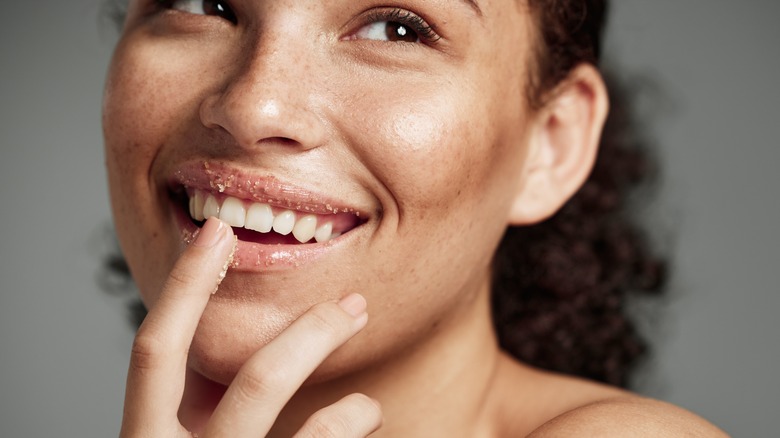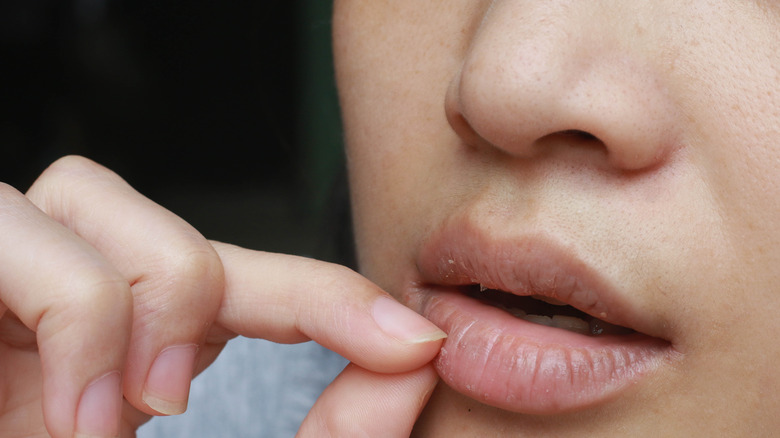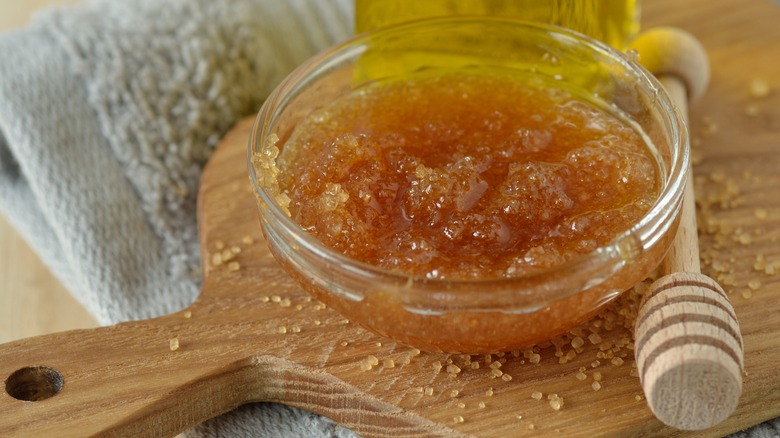Is There Such A Thing As Exfoliating Your Lips Too Much?
Exfoliating your lips is essential for preventing dryness, flaking, and chapping, but you need to do it right. For example, lip scrubs can be bad for your lips due to their abrasive action. If you overuse them, you might end up with hyperpigmentation and micro-injuries. The skin on your lips is thin and sensitive and, therefore, requires special care, says dermatologist Kristina Collins.
"Lips also lack melanin and appear pink due to the hue of vessels underlying the very thin skin barrier. And they don't contain hair follicles or oil glands like the rest of the skin," Dr. Collins told Ipsy. These factors make your lips vulnerable to dehydration, sun damage, and chemicals. You also need to avoid over-exfoliation, which contributes to dry, cracked lips.
How often you should exfoliate your lips depends on your skin type, beauty routine, individual tolerance, and weather conditions. For instance, harsh weather may cause chapped lips, so it makes sense to exfoliate (and moisturize!) more often during the winter. Over-exfoliation, on the other hand, can irritate the delicate skin on your lips, resulting in flaking and wrinkles.
This is why you shouldn't over-exfoliate your lips
Regular exfoliation helps remove dead skin cells from your lips, leading to a fresher and more vibrant appearance. Over time, it can contribute to softer, suppler lips and improve the absorption of topical products, such as lip balm and moisturizers. The problem is that few people know how to do it properly. If your lips are constantly irritated, you might be over-exfoliating them.
As a general rule, exfoliate your lips once or twice a week. Anything more than that can cause dry skin, swelling, irritation, redness, or even bleeding. Your lips may start cracking and become sensitive to the touch, resulting in discomfort. Over-exfoliation can also affect the moisture of your lips, leaving them prone to flakiness. The constant dryness and chapping can make them more vulnerable to cold weather, sun damage, and other environmental factors, which may contribute to premature aging.
Note that some exfoliators, especially those containing salicylic acid, can further irritate dry, chapped lips. The same goes for menthol, a common ingredient in flavored lip balms and other topical products. Also, avoid using a toothbrush to exfoliate your lips, especially if they're already irritated.
How to exfoliate your lips without causing further damage
Exfoliating your skin daily can cause a lot of damage, from wrinkles and breakouts to dryness. Sure, you won't get zits on your lips, but you may experience swelling, irritation, and other issues. Your best bet is to moisturize your lips and apply a mild exfoliator. "Scrubbing skin that is already dry can lead to inflammation and cracks in the outer skin layer that actually makes the dryness worse in the end," explained dermatologist Dr. Josh Zeichner in an interview with Byrdie.
"When you use a scrub, you're removing the protective outer layer of the lips, leaving them even more compromised," said Dr. Dennis Gross, another dermatologist interviewed by Byrdie. Given this aspect, it's best to skip the scrub or use a gentle one every now and then. If you choose the latter option, use mild ingredients like cinnamon, sugar, or coffee grounds to exfoliate your lips. Apply them with your fingertips in circular motions, rinse with warm water, and then follow with an emollient, such as coconut oil, shea butter, or honey.
Freshly exfoliated lips are more sensitive to the sun, so it's best to use a lip balm with a good SPF (sun protection factor) before leaving home. Ideally, choose one without alcohol, camphor, phenol, fragrances, or other irritating ingredients. For optimal protection, the SPF should be 15 or higher.


